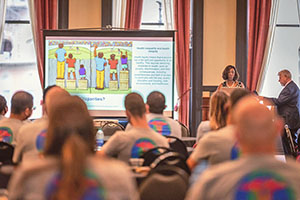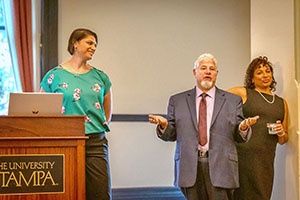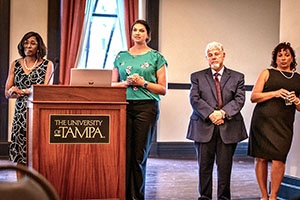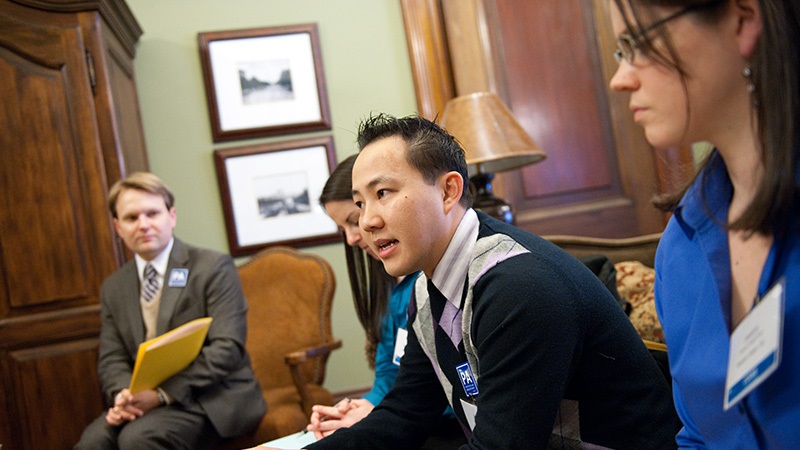AAPA Diversity, Equity, and Inclusion Resource Center
The American Academy of PAs (AAPA) represents more than 178,700 PAs across the U.S. who practice in every medical setting and specialty. AAPA is committed to enhancing the diversity of the PA profession, addressing health inequities among patients, and fostering a staff culture that is committed to DEI.
What is Diversity, Equity, and Inclusion (DE&I)?
Diversity is about representation. It is the collective mixture of human beings and their individual identities co-existing within a specific space. These identities must be considered holistically to include race, age, gender, sexual orientation, religion, sex, disabilities, culture, and educational backgrounds.
Equity is about creating a space that promotes fairness for all regardless of their individual identities.
Inclusion is about creating a space where individuals feel they can bring their individual identities without judgment and can feel a sense of belonging and respect. Inclusion in the workplace provides opportunities for people of all identities to participate and have an impact in a meaningful way.
Formation of the AAPA DE&I Commission
AAPA’s Board of Directors established an AAPA DEI Commission in August 2020. Director-at-Large CDR Billy Collins, DHSc, MS, PA-C, led an ad hoc committee to create meaningful and measurable commission charges, which were approved by the Board in September 2020. Robert Wooten MS, PA-C, DFAAPA, Assistant Professor, Wake Forest School of Medicine, Department of PA Studies, and past president of AAPA, serves as chair of AAPA’s Diversity, Equity and Inclusion (DE&I) Commission.
DE&I Commission Presentation
The DEI Commission did a presentation in collaboration with NCCPA’s President Dawn Morton- Rias at the University of Tampa during their Diversity In Healthcare Event.
Internal AAPA DE&I Resources

Achieving Health Equity: Addressing Provider Bias and the PA Workforce Diversity Gap
Race-based Medicine: Valid Science or Racist Ideology?
- Diversity, Equity, and Inclusion CME Series (Courses in the series listed below.)
- Bias: What You Don’t Know Can Hurt You and Your Patients
- Integrating Race Conversations into Healthy Patient-Provider Interactions
- Is Mental Health the Forgotten Pandemic?
- The Role of Social Determinants of Health in Clinical Practice and Subsequent Health Outcomes
- Developing the Next Generation of PA Leaders to Advance DEI and Health Equity
- The Power of the Provider: The Force We Bring as One
- Vital Minds Podcast Episode 21 – Health Inequities: Understanding Data and Bridging the Care Gap
Student Scholarships
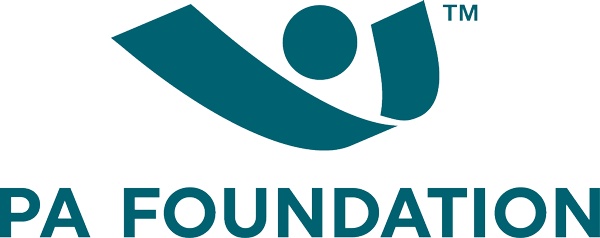
PA Foundation
The PA Foundation has awarded more than $2.3 million in scholarships to PA students, benefitting more than 1,400 future PAs. Scholarships are awarded based on the availability of funds provided through contributions from PA Foundation donors and other partners. The Foundation’s scholarship offerings include opportunities for Black PA students and students who identify as an underrepresented minority and/or economically disadvantaged and/or educationally disadvantaged.
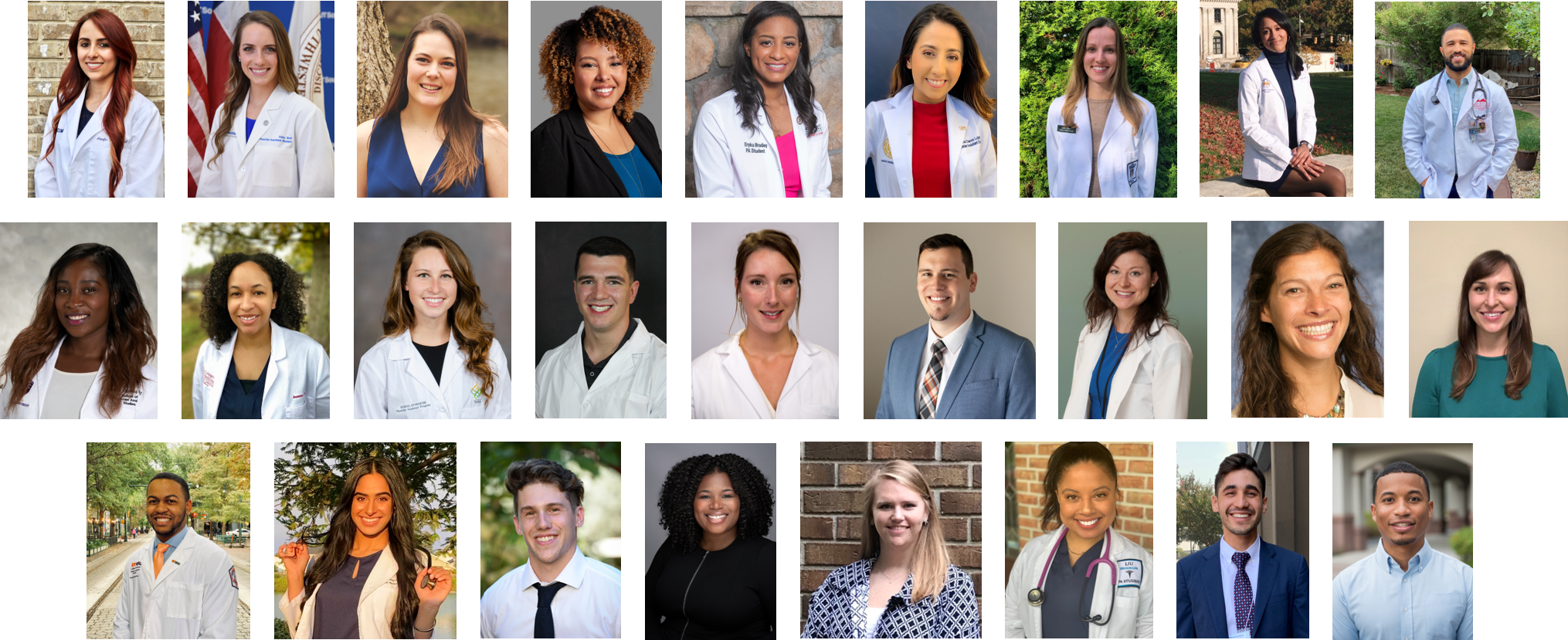
African Heritage Caucus – LBGTPA Caucus Student Leader Fellowship
The purpose of the fellowship is for leaders in medicine to reflect the communities we serve. The jointly-sponsored fellowship program was piloted in 2020 in the hopes that, together, we can support PA students who identify as Black or of African heritage, as well as LBGT, and who desire service through leadership.
Full Tuition Scholarship to Chapman PA Program
The new Simon Scholar Physician Assistant Program at Chapman University creates pathways for students facing adversity by offering full-tuition scholarships.
News & Communications

- Charting A Path to Health Equity 2023-2024
- Cross-Orgs Reaffirm Commitment to EDI
- AAPA Reflects on Martin Luther King Jr. Day 2021
- AAPA Reports on Diversity, Equity, and Inclusion Efforts To Date
- The Case for Diversity and Inclusion in PA Cohorts
- PA Foundation Announces Scholarship for Black PA Students
- Charting CME on Health Disparities Leads to Positive Changes in PA Practice
Research & Policy

Gender Equity
- Wage Parity: An AAPA analysis of compensation data in 2019 shows that female PAs are paid on average 92.6 cents for every dollar that male PAs are paid.
- JAAPA article: Reexamining the persisting wage gap between male and female PAs
Racism
- AAPA Resolutions Pertaining to Racism in 2020-2021 Policy Manual
- HP-3700.1.2 – Guidelines for Ethical Conduct for the PA Profession policy paper.
- HX-4100.1.4 – AAPA supports equal rights for all persons and supports policy guaranteeing such rights.
- HX-4100.1.5 – AAPA supports laws, policies, regulations, and judicial precedents regarding people living with HIV/AIDS that are in accordance with certain principles.
- HX-4100.1.11 – AAPA believes that PAs should provide culturally effective care, which is defined as the delivery of care to a diverse population within the context of appropriate knowledge, understanding, and appreciation of all cultural distinctions leading to optimal health outcomes.
- HX-4100.13 – AAPA recognizes that racism, in its systemic, structural, institutional, and interpersonal forms, is an ongoing urgent threat to public health, the advancement of health equity, and excellence in the delivery of medical care. AAPA affirms its commitment to anti-racism values, defined as the intent to change institutional culture, policies, practices, and procedures to remove systemic, structural, institutional, and interpersonal racism. AAPA supports the elimination of all forms of racism.
- HX-4600.1.5 – AAPA believes that PAs should endorse and support policies and programs that address the elimination of health disparities and commit to activities that will achieve this goal. AAPA supports forming “strategic partnerships” with other organizations that will help advance the elimination of health disparities.
- HX-4600.1.6 – AAPA recognizes that discrimination contributes to health disparities. AAPA supports 27 legislation and policies that will eliminate discrimination.
- HX-4600.1.6.1 – Health Disparities: Promoting the Equitable Treatment of All Patients policy paper.
DE&I Program Partners
Learn more about AAPA’s DE&I Partner Program
AAPA is committed to advancing diversity, equity and inclusion (DE&I) at our organization and within the PA profession. AAPA works to enhance the diversity of the PA profession, address health inequities among patients, and foster a staff culture that is committed to DE&I. Through AAPA’s DE&I Partner program, corporate partners contribute to AAPA’s ongoing efforts to create and host innovative programming and events for the profession and the community. To learn more about becoming a DE&I Partner, please contact AAPA Clinical Affairs, [email protected].
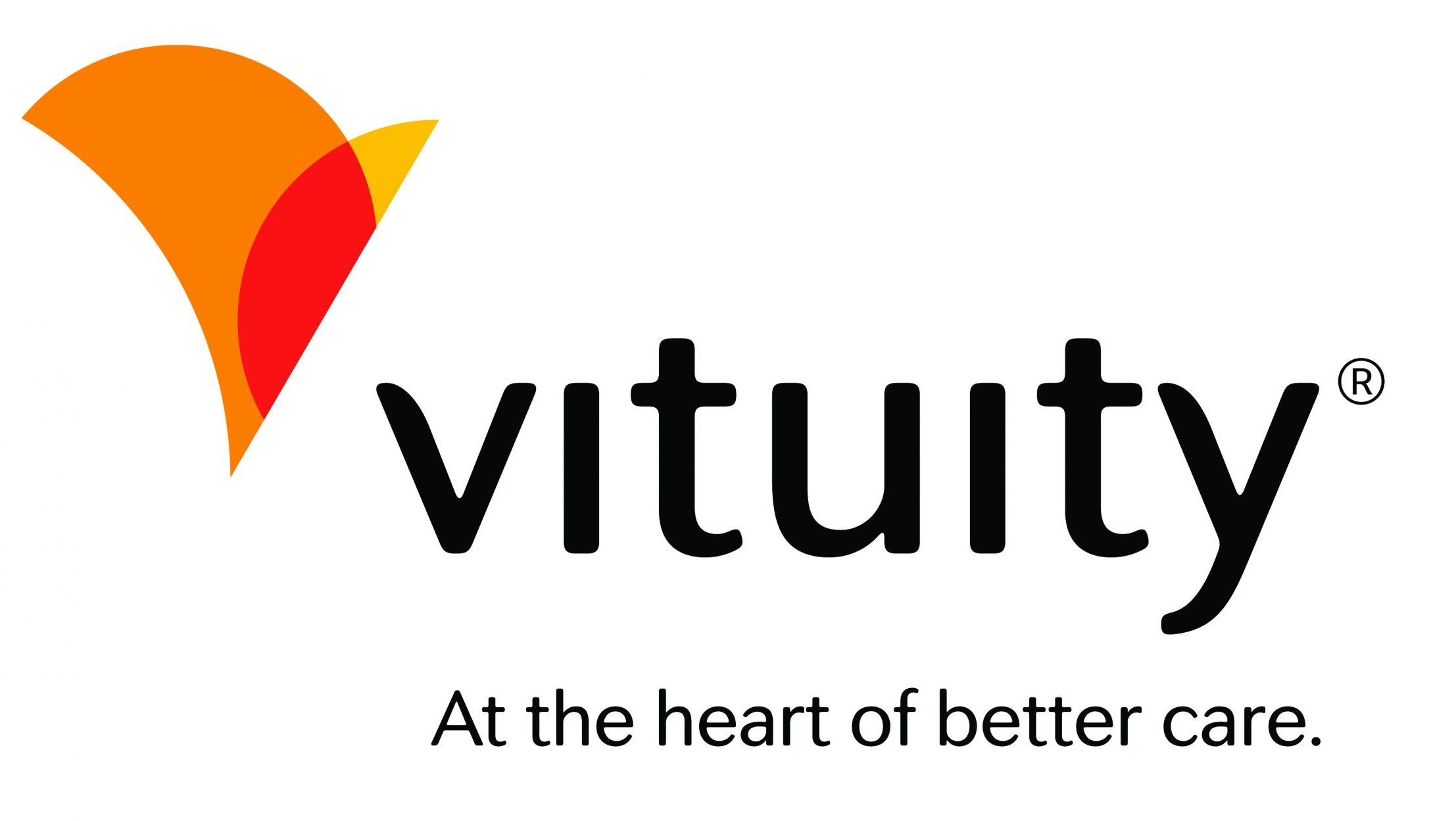 Vituity is a DE&I GOLD Partner.
Vituity is a DE&I GOLD Partner.
Increasing Representation in the PA Profession
Project Access
Project Access is a program supported by AAPA and the Physician Assistant Education Association (PAEA) where PAs and PA students visit middle and high schools to talk to historically marginalized minority students about the PA profession.
PAthways Program
An initiative focused on fostering diversity within the PA profession. Now accepting applications for the Western Slope of Colorado program, backed by a generous grant from the Colorado Health Foundation.
Apply To Be A Mentor: Learn More
Apply To Be A Mentee: Learn More
External Resources
Articles
- “Diversity in Healthcare” by Kathleen Curtis
- “6 Ways to Improve Diversity in Your Hiring” by Alisa Tank
- “Why I don’t facilitate privilege walks anymore and what I do instead” by Meg Bolger
- “I Can Fix It!” by damaliayo
- “White Privilege: Unpacking the Invisible Knapsack” by Peggy McIntosh
- “Allies, Advocates, and Accomplices Are Critical to Diversity and Inclusion” by Dara Kass, MD
- “Diversity and Inclusion in Medical Schools: The Reality” by Jennifer Tsai
- “How Should Organizations Respond to Racism Against Health Care Workers?” by Ann Marie Garran, PhD and Brian M. Rasmussen, PhD
Books
- Four Hundred Souls: A Community History of African America, 1619-2019 by Ibram X. Kendi & Keisha N. Blain
- Carte Blanche: The erosion of medical consent By Harriet A. Washington
- Race Talk and the Conspiracy of Silence by Derald Sue Wang
- Uncomfortable Conversations with a Black Man by Emmanuel Acho
- Uncomfortable Conversations with a Black Boy by Emmanuel Acho
- So You Want to Talk About Race by Ijeoma Oluo
- White Fragility by Robin DiAngelo
- Those Who Forget: My Family’s Story in Nazi Europe – A Memoir, A History, A Warning by Geraldine Schwarz
- Mind the Gap: Hierarchies, Health and Human Evolution; The Impact of Inequality: How to Make Sick Societies Healthier; Unhealthy Societies: The Afflictions of Inequality by Richard G. Wilkinson
- Why Are All the Black Kids Sitting Together in the Cafeteria, and Other Conversations About Race by Beverly Daniel Tatum, PhD
- How to Be an Antiracist by Ibram X. Kendi
- This Book is Anti-Racist: 20 Lessons on How to Wake Up, Take Action, and Do the Work by Tiffany Jewell
- Lies My Teacher Told Me: Everything Your American History Textbook Got Wrong by James W. Loewen
- Medical Apartheid: The Dark History of Medical Experimentation on Black Americans from Colonial Times to the Present by Harriet A. Washington
- Best Sellers in Children’s Prejudice & Racism Books
Resources on Health Equity/COVID-19
- Agency for Healthcare Research and Quality – Social Determinants of Health Database
- All of Us Research Program
- All of Us Research Program – Diversity and Inclusion
- All of Us Research Program – Program FAQ Fact Sheet
- All of Us Research Program – Diversity Fact Sheet
- CDC – COVID-19 Racial and Ethnic Health Disparities
- CDC – Racial and Ethnic Approaches to Community Health
- National Academy of Medicine – Resources on Health Equity/COVID-19
- HHS Office of Minority Health – COVID-19
- CDC – Health Equity and COVID-19
- COVID-19 Vaccine Education and Equity Project
- Health Professionals Advancing LGBTQ Equality
- Stop AAPI Hate
- The AAPI COVID-19 Project
- Asian Americans Advancing Justice
- Asian American Racial Justice Toolkit
- The Inclusive Care Project
Podcasts
This podcast highlights disparities evidenced in common chronic conditions featured in the “vicious cycle” (e.g. diabetes, cardiovascular disease, chronic pain, mental health) and musculoskeletal/arthritis conditions, with emphasis on disparities and how social determinants of health impact these conditions and their management.
Videos
Webinars
AAPA’s Commitment
AAPA represents more than 178,700 PAs across the U.S. who practice in every medical setting and specialty. AAPA is committed to enhancing the diversity of the PA profession, addressing health inequities among patients, and fostering a staff culture that is committed to DEI.
Fostering a Staff Culture Committed to Diversity, Equity, and Inclusion
AAPA is committed to fostering a staff culture that embraces the values of diversity, equity, and inclusion. We recognize that embracing the principles of diversity, equity, and inclusion in the workplace is essential to improved collaboration and morale as well as greater innovation, productivity, and representation in the work we do both internally and externally within our communities.
Working to Enhance the Diversity of the PA Profession
Research shows positive benefits to patients when there is greater diversity among healthcare providers. AAPA recognizes that medicine in general is too homogenous and so is the PA profession. We are committed to implementing partnerships and programs that attract more underrepresented minorities to the profession and providing the tools and resources to support them – prior to and during PA school, as well as while they are practicing.
Addressing Health Inequities Among Patients
AAPA acknowledges that racism is a public health issue and one of many social determinants of health, including poverty, unequal access to healthcare, lack of education, and stigma that contribute to health inequities in patients. AAPA is committed to empowering PAs with information, tools, and resources to address these inequities in their daily practice and to use our collective voice to support policy solutions when appropriate.
PA Foundation 2020-2021 Five-Step Call to Action Plan
As the PA community joins with the nation in recognizing the need for greater awareness of diversity, equity, and inclusion, the PA Foundation Board of Trustees acknowledges the unique role the Foundation has in these endeavors. This five-step plan is designed to bring greater awareness, education, and programmatic opportunities aimed at impacting the PA profession, the healthcare community, and the patients our community serves in the areas of diversity, cultural competency, social responsibility, and inequity.
Ask a Question
For questions on AAPA’s work to advance diversity, equity, and inclusion, please contact Jennifer M. Orozco, Chief Medical Officer, American Academy of PAs at [email protected].
Recommend Resources
If you have recommendations for additional external resources, email [email protected].
